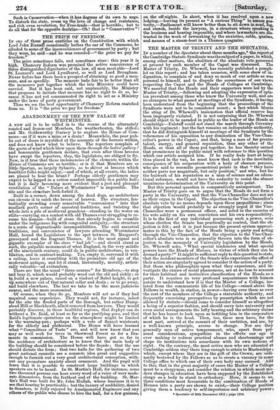ABANDONMENT OF TICE NEW PALACE OF WESTMINSTER.
A NEW aid is to be called in to the rescue of the alternately roasted and frozen-ant Members, the weatherbeaten, the stifled; and Mr. Goldsworthy Gurney is to explore the House of Com- mons—as if it were a mine or a drain ! Meanwhile, the poor pub- lic: out of doors is mystified at the accounts of the horrors within, and does not know what to believe. The reporters complain of the gusts of wind which blow upon them through the ladies' gallery .1 and honourable gentlemen declare, that even after those breezes have swept the reporters, they, the legislators, are obliged to fly. Now, is it true that these inclemencies of the elements within the House of Commons are so terrible ; or is it that Members are so little Spartan, so largely Sybarite, as to shiver at breezes which healthier folks might enjoy,—and of which, at all events, the ladies are placed to bear the brunt ? Perhaps elderly gentlemen may expect to be lapped in a cotton comfort impossible in a public hall; but it is daily becoming more evident that a just and pleasant ventilation of the "Palace at Westminster" is impossible. The site and the structure both forbid it.
Built in a corner, down among the dead dogs, no architecture can elevate it to catch the breeze of heaven. The structure, fan- tastically crowding every conceivable " convenience " into that mudlark poet's corner of ancestral traditions, and twisting the whole into a pile of medieval grandeur—standing in the water on stilts—carrying on a contest with old Thames ever struggling to re- sume his domain—built of stone that already begins to crumble under the indigenous fog with congenital antiquity,—the structure is a cent° of impracticable incompatibilities. The said ancestral traditions, and convenience of lawyers attending Westminster Hall, bound the Legislature to the spot between St. Margaret's
graveyard and thef t Thames. It is the most signal and gigantic exemplar ofrar Class " bad job "—and should stand as snob, the palpable monument of what England, in the very middle of the nineteenth century, could do in public architeoture, in ven- tilation, and in contract-making. Yes, empty it, surround it with a railing, leave it crumbling with the premature old age of the modernest antique, and let it stand, historically, morally, artisti- cally valuable—ad evitandum.
There are but the usual "three courses" for Members,—to stop and bear it, which would probably weed out the old and sickly ; or to ;build a new palace, raised on a viaduct of Babel height, to get up somewhere out of that natural cellar and drain ; or to go away, and build elsewhere. The last we take to be the more judicious course, and the more economical.
• Of course, when they do go, Members will act as if they had acquired some experience. They would not, for instance, select for the site the flooded parts of the Borough, but rather Hamp- stead Hill or Blackheath, albeit removed from lawyers. They would probably discover, in those healthful regions, that Zephyr can do without a Dr. Reid,, at least so far as the purifying goes, and that Reid's legitimate operntions on the atmosphere might be limited to the warming-pan ; perhaps with a vote of flannel waistcoats for the elderly and phthisieal. The House will have learned what "Committees of Taste" are, and will now know that you may as well seek for trees in Sherwood Forest as for a Bra- mante in commission. The House will have got so far in the accidence of architecture as to know that the main body of the building should be considered before the façade ; that the use should dictate the form ; that two halls for the gathering of two great national councils are a concrete idea great and suggestive enough to furnish out a very good architectural conception, with- out any premature anxiety about ornament. And the pupil will learn that it is possible to construct large buildings in which speakers are to be heard. In St. Martin's Hall, for instance, some two thousand persons can hear every word of a voice of very mode- rate dimensions, from the furthest end of the building. St. Mar- tin's Hall was built for Mr. John Hullah, whose business it is to see that hearing be practicable ; but the luxury of audibility, denied to Senators, is fully enjoyed by Amalgamated Engineers and any others of the public who choose to hire the hall, for a few guineas,
on the off-nights. In short, when it has resolved upon a new lodging,—leaving its present as " A. curious Thing" to amuse pos. tenty,—Parliament will know better than to sit down in mud, Lib and stench, beside the lawyers, in a structure where speaking is the business and hearing impossible, and where lawmakers are die. traded in the work of lawmaking by the anxieties, colds, qualms, and nausea of a steam-boat in a Thames quagmire.


























 Previous page
Previous page